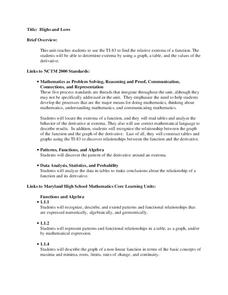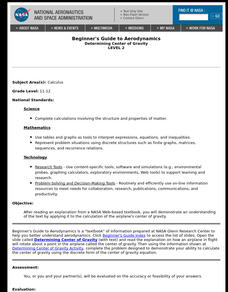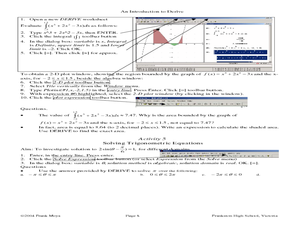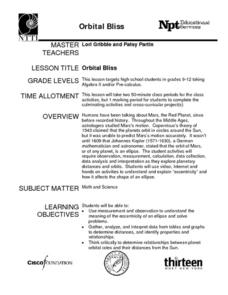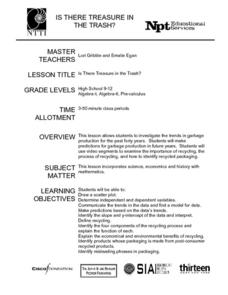Curated OER
Highs and Lows
Solve problems using integration and derivatives. By using calculus, learners will analyze graphs to find the extrema and change in behavior. They then will identify the end behavior using the derivatives. Activities and handouts are...
Curated OER
Getting a Little "Lift"out of Calculus
Students, after entering the given conditions into FoilSim, apply calculus techniques to verify predictions.
Curated OER
Disc/Washer Method
Students calculate the volume of solids. In this calculus lesson, students apply the Disk and Washer Method to solve for the volume of three dimensional objects. They calculate the volume caused by rotation that create sections that are...
Curated OER
Maxima and Minima Problems
Young scholars calculate the maxima and minima of quadratic equations. In this calculus lesson plan, students apply the derivatives by finding the maxima and minima using real life application. They solve optimization using the derivative.
Curated OER
Cutting Corners - Parts 1 and 2
Students use optimization concepts to design their own container. In this optimization lesson plan, students understand how the optimization concept is critical in calculus and why products are packaged the way they are.
Curated OER
Exploring the FTC using the TI
Young scholars use the Fundamental Theorem of Calculus to solve problems. In this calculus lesson, students use the TI to solve the graphing porting of the problem. They practice graphing functions and discuss their place in the real world.
National Security Agency
Multiple Representations of Limits
After an introductory activity to demonstrate the theory of a limit, additional activities approach a limit from graphical, numerical, and algebraic methods. The activity looks at the multiple ways of understanding and evaluating a limit.
Curated OER
Area Under A Curve
Calculus students use the derivative and integral to solve problems involving areas. They calculate the area under a curve as they follow a robot off road making different curves along the drive, using Riemann Sums and Trapezoidal rules...
Curated OER
Extreme Values
Students sketch a picture of what appears on a computer screen. Locate the extreme points on the pictures and label them as maxima or minima. Use the definitions of maxima and minima to explain how you identified the points indicated, if...
Curated OER
Gravity: A Relatively Heavy Subject
Students examine planetary movement and its relation to the tide.For this gravity lesson students describe how and why the high and low tides change every day.
Curated OER
Determining Center of Gravity
Students complete calculus calculations involving the structure and properties of matter and determining the center of gravity.
Curated OER
An Introdcution to Derive
Twelfth graders explore Derive. In this Calculus lesson plan, 12th graders investigate the menus and tools available in Derive. In addition to the familiarization part of the lesson plan, students investigate Pascal’s Triangle,...
Curated OER
Vertical and Horizontal Translations
Pupils analyze function graphs. In this Algebra II/Pre-calculus lesson, students investigate the graph of a function as they determine to which family of functions it belongs, determine the parent function and describe the translation...
Curated OER
L'Hopital's Rule
Pupils discover and perfect methods of calculation based on rewriting, simplifying, and logarithmic L'Hopital when the traditional applications fail to produce a result.
Curated OER
The World Population: Logistic Model
Students explore the various uses of the logistic function. Students use the internet to collect world population data and find a logistic model for their data and use their chosen model to predict future populations.
Curated OER
Miras, Mirrors, and Kaleidoscopes!
Learners use hands-on activities to explore transformations. They view a video segment that demonstrate how M. C. Escher employed geometry and transformations to create so many of his famous drawings.
EngageNY
Integer Sequences—Should You Believe in Patterns?
Help your class discover possible patterns in a sequence of numbers and then write an equation with a lesson that covers sequence notation and function notation. Graphs are used to represent the number patterns.
Curated OER
Graphs and Data
Students investigate poverty using graphs. In this algebra lesson plan, students collect data on the effects of poverty and use different rules to analyze the data. They graph and use the trapezoid rule to interpret the data.
Curated OER
Orbital Bliss
Most young mathematicians are aware that the planets don’t orbit the sun in a circle but rather as an ellipse, but have never studied this interesting feature. This resource looks at the planetary orbits in more detail and helps learners...
Curated OER
Is there Treasure in Trash?
More people, more garbage! Young environmentalists graph population growth against the amount of garbage generated per year and find a linear model that best fits the data. This is an older resource that could benefit from more recent...
Curated OER
The Mathematical Dynamics of Celestial Navigation and Astronavigation
Young scholars explore the different methods used in celestial Navigation and astronavigation. In this math lesson, students construct a sextant and demonstrate how it works.
Curated OER
Attributes of Renewable Energy: From Nanopossibilities to Solar Power
Students explore solar energy, why we use it and how we use it. In this renewable energy instructional activity students compare active and solar techniques.
Curated OER
Less is More: Realizing Mathematics Through Agriculture
Students study the architectural designs of different popular sites. In this math instructional activity, students draw a grid diagram. They explain what geodesic algorithms are used for.
Curated OER
Making Movies
Students use interactive white boards to solve math problems. In this math problems lesson plan, students produce math casts where they can solve problems, write out descriptions, and communicate what they know and do not know on the...


